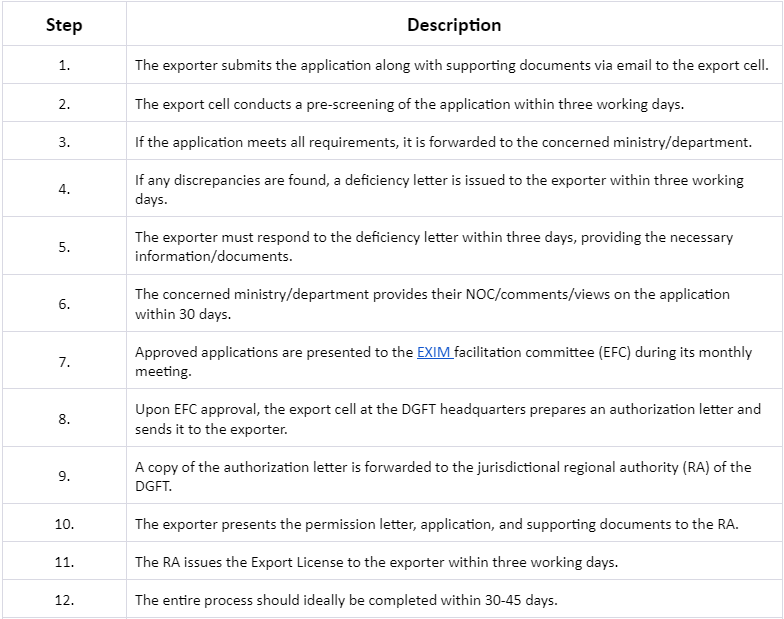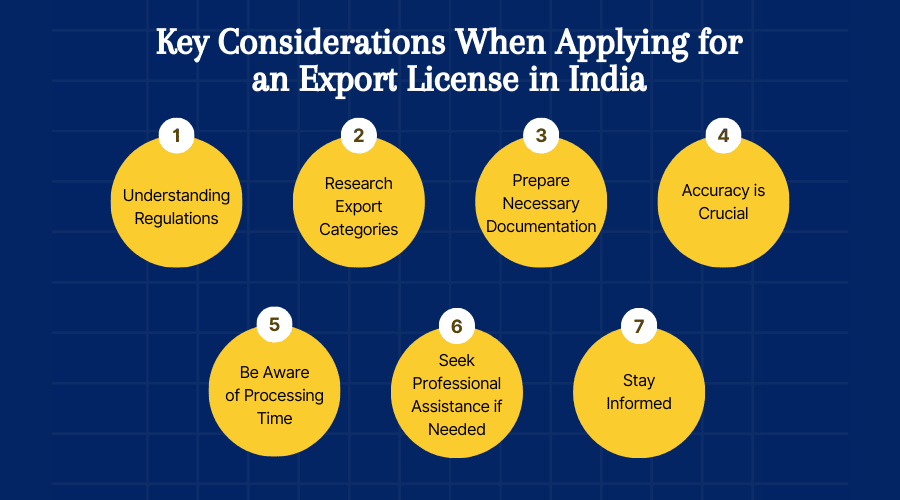[vc_row][vc_column][vc_column_text][/vc_column_text][/vc_column][/vc_row][vc_row el_class=”padding-sm-bottom-40″][vc_column offset=”vc_col-lg-8 vc_col-md-8″ el_class=”post-details-sec”][vc_single_image image=”12241″ img_size=”full” css=”.vc_custom_1709272790816{margin-bottom: 44px !important;}”][vc_row_inner css=”.vc_custom_1608297138483{margin-bottom: 0px !important;}”][vc_column_inner][vc_column_text]Looking to expand your business into international markets? Securing an Export License is your first step towards success. In India, exporting goods requires compliance with certain regulations, and obtaining an Export License is a crucial part of the process. This license serves as official permission from the government to engage in exporting activities, ensuring that your goods meet the necessary standards and regulations for international trade.
But how exactly do you apply for an Export License in India & how to get export license? Don’t worry, we’ve got you covered!
In this blog, we’ll guide you through the step-by-step process of applying for an Export License, helping you navigate the paperwork and requirements with ease. Whether you’re a seasoned exporter or new to the game, understanding the Export License application process is essential for growing your business and tapping into global opportunities. Let’s dive in and unlock the doors to international trade success!
What is an Export License?
An Export License is a permission granted by the government to export certain goods from India. To understand which goods need a license, we use a classification system called the Indian Trade Clarification (ITC) based on the Harmonized System of Nomenclature (HSN).
If goods are classified as ‘restricted’ in this system, they require an Export License to be exported. The Foreign Trade Policy (FTP) generally allows free export of goods, but some items like live animals, endangered plants and animals, sandalwood, and silk need a license. The rules for exporting different products are outlined in Schedule II of the ITC-HS code, and the Directorate General of Foreign Trade (DGFT) oversees these regulations. For instance, silk exports are restricted, so an Export License is needed to export silk from India.
All The Parties Involved When Applying for an Export License in India
When applying for an export license in India, several parties are involved in the process. These include:
Exporter: The individual or company seeking authorization to export goods from India.
Directorate General of Foreign Trade (DGFT): The government body responsible for formulating and implementing foreign trade policies in India. DGFT oversees the issuance of export licenses and ensures compliance with export regulations.
Administrative Ministries/Departments:Depending on the nature of the goods being exported, specific administrative ministries or departments may be involved in processing export license applications. These ministries or departments may request additional documentation or provide comments/recommendations on the application.
Export Promotion Councils (EPCs): EPCs play a role in promoting and facilitating exports from India. They may provide guidance and support to exporters during the application process.
Customs Authorities: Customs authorities are responsible for verifying the export documentation and ensuring compliance with customs regulations before allowing goods to be exported.
Jurisdictional Regional Authority (RA): The RA is responsible for issuing the export license to the exporter upon approval from the DGFT. They may also provide assistance and guidance to exporters during the application process.
Consultants/Legal Experts: Exporters may seek assistance from export consultants or legal experts to navigate complex export regulations and ensure compliance with export laws.
These parties work together to facilitate the issuance of export licenses and ensure that export activities adhere to regulatory requirements.
Easy Steps to Apply for an Export License with DGFT
Applying for an Export License with the Directorate General of Foreign Trade (DGFT) is a straightforward process that can be completed online. Follow these easy steps to initiate your Export License application:
- Visit the DGFT website and navigate to the ‘Services’ section.
- Select the ‘Online ECOM Application’ option.
- Choose ‘Restricted Item Import License/Restricted Export Item’.
- Fill out the online application form with all required details, ensuring accuracy and completeness.
- Submit the completed application online.
- Email a copy of the application to export-dgft@nic.in in PDF format for verification.
- Await further instructions or communication from the DGFT regarding your Export License application status.
By following these simple steps, you can start the process of obtaining an Export License efficiently and hassle-free.
How to Get Export License: Essential Documents
To ensure a smooth application process for your Export License, it’s vital to have all the necessary documents ready. Here’s a list of documents you’ll need to attach along with your application:
- ‘Profile of Exporter and Importer’ Form (ANF-1): Complete this form with accurate information about your business.
- Application Form for Export License (ANF-2N): Fill out this form specifically for applying for a license to export restricted items.
- Copy of Purchase Order/Import Order or Contract Agreement: Provide documentation showing the agreement between you and the foreign purchaser.
- Proof of Online Payment: Ensure you have proof of payment for the application fee made online.
- Copy of PAN Card: Include a copy of your PAN card for identification purposes.
- Copy of Identity Proof: Submit a copy of a valid identity proof document.
- Address Proof: Attach a document verifying your business address.
- Bank Certificate or Canceled Cheque: Provide proof of your banking details.
- NOC (No Objection Certificate) for Rental Property: If your business operates from a rented property, include an NOC from the property owner.
Gathering these documents beforehand will streamline the application process and increase your chances of a successful Export License application.
Step-by-Step Guide: Standard Procedure for Obtaining an Export License

Key Considerations When Applying for an Export License in India

Things to be careful of when applying for an export License in India.
Understanding Regulations: Familiarize yourself with export regulations and restrictions imposed by the Directorate General of Foreign Trade (DGFT) to ensure compliance.
Research Export Categories: Determine the category of goods you intend to export and whether they are subject to any special licensing requirements or restrictions.
Prepare Necessary Documentation: Gather all required documents, including application forms, supporting paperwork, and identification documents, to facilitate a smooth application process.
Accuracy is Crucial: Ensure all information provided in the application is accurate and up-to-date to avoid delays or rejection of the application.
Be Aware of Processing Time: Be mindful of the processing time for export license applications and plan accordingly to avoid any delays in exporting your goods.
Seek Professional Assistance if Needed: Consider seeking guidance from export consultants or legal experts to navigate complex regulations and ensure compliance with export laws.
Stay Informed: Keep yourself updated on any changes or updates to export regulations and requirements issued by the DGFT to maintain compliance with current laws.
Conclusion
During the processing of the application, administrative ministries and departments may request specific documents, varying depending on the item being exported. These documents must be submitted along with the application before the ministries can provide their comments or recommendations.
The Export License, also referred to as permission, certificate, or authorization, is typically valid for a specific period determined by the RA. It may be subject to various terms and conditions, including the quantity and description of items, value addition, minimum export/import price, and export obligation. Export activities must adhere to the provisions outlined in the Export License or relevant DGFT public notices.
[/vc_column_text][vc_empty_space height=””][/vc_column_inner][/vc_row_inner][/vc_column][vc_column width=”1/3″ offset=”vc_hidden-sm vc_hidden-xs” el_class=”post-col” css=”.vc_custom_1638872146414{padding-left: 50px !important;}”][vc_widget_sidebar sidebar_id=”consulting-right-sidebar” el_id=”single-right-siebar”][/vc_column][/vc_row][vc_row][vc_column][vc_column_text][/vc_column_text][/vc_column][/vc_row][vc_row css=”.vc_custom_1638349264629{padding-top: 100px !important;padding-bottom: 80px !important;}”][vc_column][vc_custom_heading text=”Related Post” font_container=”tag:h2|font_size:25px|text_align:center|color:%233c3c3c” google_fonts=”font_family:Poppins%3A300%2Cregular%2C500%2C600%2C700|font_style:600%20semi-bold%3A600%3Anormal” css=”.vc_custom_1638774169659{margin-bottom: 30px !important;}”][vc_raw_html]JTVCc21hcnRfcG9zdF9zaG93JTIwaWQlM0QlMjIxMDAwNSUyMiU1RA==[/vc_raw_html][/vc_column][/vc_row][vc_row][vc_column][vc_column_text]
[/vc_column_text][/vc_column][/vc_row]